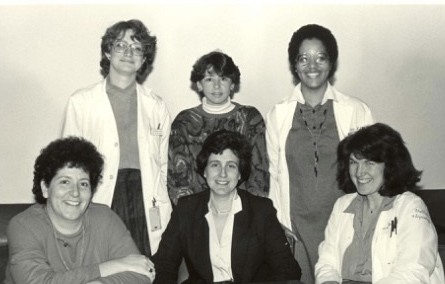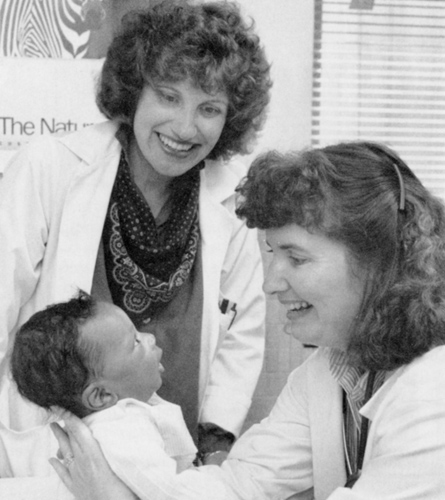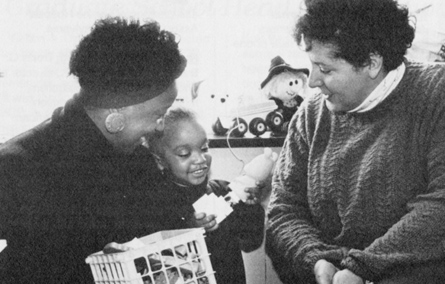SAMHSA Grant Supports Caring Together’s Critical Mission
By Lisa Ryan and Nancy West

Thanks to a $2.6 million, five-year grant from the Substance Abuse and Mental Health Services Administration (SAMHSA), the Caring Together program and its medical director, Barbara Schindler, MD, WMC ’70, will be better able to treat substance use disorders across the lifespan.
The grant will allow Caring Together to expand its network of peer support specialists and its community screening for substance use disorder, as well as continuing its decades-long work to help women and their children engage in and sustain their recovery.
Caring Together was founded in 1990 by Schindler and colleagues at the Medical College of Pennsylvania (MCP). SAMHSA grant funds helped launch the program, which has continued to benefit many times over the years from the organization’s support. The initial grant was made possible by Schindler’s receipt of the Mary DeWitt Petit Fellowship in 1987. The $10,000 award, originally established jointly by the Trust Fund of the Alumnae/i Association of WMC/MCP and the estate of Mary DeWitt Pettit, MD — a longtime chair of MCP’s Department of Obstetrics and Gynecology — supports the research of junior female faculty members. Schindler says that the data collected using those funds were the foundation of her first SAMHSA grant application.
An Urgent Need

Trude Haecker, MD, MCP ’80, (left) and nurse practitioner Martha Cockerill check on a baby in the Caring Together program. This photo appeared in the Fall 1990 MCP Alumnae/i Magazine.
The program, initially slated to last just three years, was first launched to address the epidemic of babies being born to women with substance use disorder. A 1989 study of Philadelphia hospitals noted that between 6 and 25 percent of their newborns were known to have been exposed to cocaine in utero, putting them at risk for premature birth, birth defects and sudden infant death syndrome, among other conditions.
In addition to Schindler, the program founders included longtime MCP faculty member Sonia Imaizumi, MD, Ann Honebrink, MD, MCP ’81, and May-Ange Ntoso, MD, who completed her obstetrics and gynecology residency at Hahnemann University Hospital. Trude Haecker, MD, MCP ’80, assisted by working in the pediatric clinic caring for the babies of the women in the program at the outset.
“We all agreed that something needed to be done,” says Schindler, who is also a professor of psychiatry and pediatrics at Drexel University College of Medicine. “So many babies were being born prematurely, and they were often in the NICU. Some moms came in with preeclampsia. Some were agitated and depressed because they were withdrawing from cocaine. There were some maternal deaths due to placental abruption.

Sonia Imaizumi, MD, and addictions counselor Linda Ann Grier work with a child in Caring Together’s mutlipurpose room. This image appeared in MCP’s Internal Journal, February 1991.
Everyone was concerned about where we were going to send these babies while waiting for their moms to take them home.” After collecting preliminary data, Schindler and her colleagues developed the idea for a comprehensive program that would provide all-inclusive care for these moms and their babies. It would include pediatrics, obstetrics and gynecology, and primary care, as well as behavioral health, because there are often mental health issues related to substance abuse.
“Drs. Honebrink, Ntoso, Imaizumi and I sat around my kitchen table to put together a plan,” recalls Schindler. “We submitted it to the National Institutes of Drug Abuse three times before we were approved for funding. But this was at the height of the AIDS epidemic and we got a call from NIDA saying that they couldn’t fund us after all because all their money had been moved to AIDS research.
They suggested that we go to SAMHSA instead. We had only 10 days to turn this proposal around. Because we had such a tight deadline, we couldn’t rely on the mail to get it there in time. So we personally drove it down to SAMSHA offices in Bethesda and put it in the drop box the day it was due.”
As part of the SAMHSA grants, Caring Together has played a significant role in educating current and future medical practitioners in the care of patients with substance use disorders. The grants have supported efforts to create novel open-access online educational programs to train practitioners in screening for substance use disorders, providing medication�assisted treatment and managing pain without opioids. Caring Together also offers onsite clinical training for first- and fourth-year medical students, psychiatric nurse practitioner students, psychiatric and family medicine residents, and master’s-level counseling and family therapy students. In addition, the program provides curricular content for second- and third-year medical students and CME lectures to practicing clinicians.
SAMSHA approved funding of $425,000 per year for three years. “It seemed like an enormous amount of money. Even though we had laid out very clearly what we were going to do with the money, it was still overwhelming,” relates Schindler.
Schindler and her colleagues met with Dr. Robert Kaye, MCP’s former chair of pediatrics, to discuss it. “He was a very wise and wonderful man,” says Schindler. “He said, ‘I just want you to sit down and catch your breath and think about this — if you keep two babies out of the NICU, you will have saved the health care system $425,000. Over three years, if you save six babies from a NICU admission, you will have saved the health care system all that money.’ That was a very powerful statement that helped us keep things in perspective.”
Schindler also recalls working with her co-founders to come up with a good name for the program. “I think we found the perfect name because Caring Together totally describes the culture of the program. Our staff is a team caring together for all the women in the program. But the women care for each other also. Those who are more established in the program take under their wings new women who are just joining.”
30 Years Later
Today, Caring Together utilizes a patient-centered, multidisciplinary approach, providing medication-assisted treatment, addiction counseling and trauma-informed care, and actively treating patients’ co-occurring psychiatric disorders. Schindler says that grant support from organizations like SAMHSA helps the program to maintain services that are not covered by patients’ insurance. The new grant will help maintain and expand Caring Together’s roster of peer support specialists, whose own experience with substance use disorder and recovery guide program participants in their processes. To connect with more young people and their families, peer specialists will work in the waiting rooms and with the staff of St. Christopher’s Hospital for Children and at Drexel University’s student health facility, when COVID-19 protocols allow it.
Additionally, the SAMHSA grant will help Caring Together focus on family reunification in circumstances where a family has been separated due to a parent’s substance use disorder. Grant funds will support the program’s continued collaboration with students and faculty in the Drexel University College of Nursing and Health Professions to provide family therapy and work with Caring Together participants toward the goal of reunification.
Schindler and her colleagues still provide psychiatric care and medication-assisted treatment to many program graduates; Schindler says it has been powerful to maintain relationships with participants who graduated from Caring Together’s core program 10 or 15 years ago. “It’s very gratifying, because for some of our most successful participants, their connection to the program wasn’t easily developed — but they finally connected and were successful in their recovery.”
Back to Top